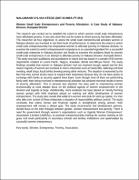| dc.description.abstract | NALUMANSI SYLVIA NTEGE (2007-03-MBA-PT-054)
Women Small Scale Entrepreneurs and Poverty Alleviation: A Case Study of Nakawa-Division, Kampala District
The research was carried out to establish the extent to which women small scale entrepreneurs have alleviated poverty. It was also done find out the extent to which poverty had been alleviated. The researcher set four objectives; to assess the small scale entrepreneurial activities women in Nakawa division are involved in and their level of performance, to determine the extent to which small scale entrepreneurship has empowered women to alleviate poverty in Nakawa division, to examine the extent to which entrepreneurial competence is an essential ingredient for a successful small-scale enterprise in Nakawa division and finally to examine the problems faced by women small scale entrepreneurs in an attempt to alleviate poverty in Nakawa division, Kampala district. This study was both qualitative and quantitative in nature and was based on a sample of 60 women respondents resident in Luzira Parish, Naguru, Kiwatule, Banda and Mbuya Parish. The study findings revealed that women in Nakawa division had not received enough capital and for this reason majority of women are involved in micro enterprises such as handcrafts, tailoring and food vending, retail shops, local drinks brewing among other ventures. The situation is worsened by the fact that they cannot access loans to expand their businesses because they do not have assets to exchange with banks as security against these loans. Even though most of them are performing fairly well, their being involved in entrepreneurial activities has achieved minimal results in terms of poverty alleviation. This is because less attention has been paid to empowering women economically as most debates focus on the political agenda of women empowerment in the division and Uganda at large. Additionally, more emphasis has been placed on merely forming women groups with little emphasis placed on training and skills development of women entrepreneurs. The study also reveals that while it is women who look for start-up capital, it is men who take over control of these enterprises a situation of responsibility without control. The study concludes that unless human and financial capital is strengthened among women, their empowerment will remain a distant goal. The study recommends that development partners, should focus on the inter linkages between gender, women empowerment and poverty. There is need for government through women’s organisations such as Uganda Women Entrepreneurs’ Association Limited (UWEAL), to promote entrepreneurship training for women starting at the grass root level particularly in secondary schools and tertiary institutions and spearheaded by successful women entrepreneurs.
Key words: Women, Entrepreneur, Poverty, Association, | en_US |


